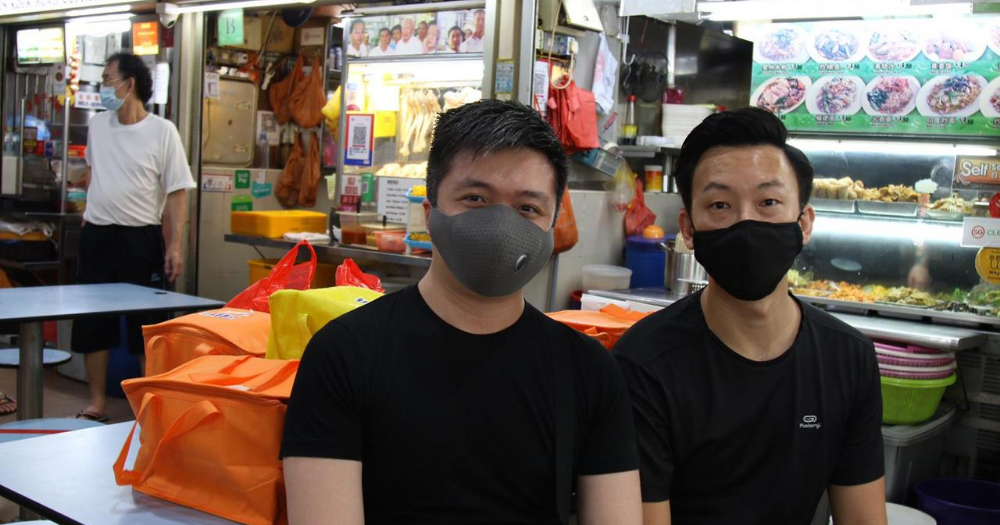It's a Wednesday morning at 10am. Normally, I would be dragging myself into the office or rolling out of bed to start work, but today I am sipping an iced lemon tea at bustling Amoy Street Food Centre.
Surrounded by older aunties and uncles enjoying their breakfast, I am sitting across from 33-year-old Elroy Lim and 30-year-old Tai Zhang Kai. They are the founders of Hawker Heroes, a food delivery service with a purpose.
Food delivery has become all the rage recently, with many new delivery platforms sprouting up to meet demand from those spending more time at home due to Covid-19.
But Hawker Heroes is quite different from many other platforms.
Set up in April this year, with the purpose of helping older hawkers who were struggling during the Circuit Breaker, Hawker Heroes employs a different model than many other food delivery companies.
They focused first on bringing in older hawkers who were hardest-hit by the pandemic, rather than going for the more popular ones who could potentially bring in the most business.
They also make things easier for hawkers who may not be so digitally-adept, as hawkers need only to provide Hawker Heroes with their menu, prices, and photos, and the company handles the rest.
Hawker Heroes doesn't charge hawkers a fee to use its platform, nor do they take a commission. Instead, they cover expenses through charging a 10 per cent handling fee, which is paid by the customer. This means that food items do not need to be marked up, so the prices listed on their website are the same as those at the hawker stalls.
Neither Lim nor Tai are paying themselves, and the company has not yet even broken even.
Instead, the goal of the company is to give back to the people whom Lim and Tai see as the "heroes" of Singapore: hawkers — hence the name Hawker Heroes.
"I think they have been heroes to Singapore for the longest time", Lim says, pointing out that Singapore is the only place in the world where meals cost S$3 to S$4, apart from less-developed countries.
"So I guess, to us, they've always been heroes in our eyes."
How Hawker Heroes began
The idea for Hawker Heroes came about when Lim was at a hawker centre during the Circuit Breaker period. Looking around, he noticed that while the younger hawkers seemed to be doing well, preparing many takeaway orders, the older hawkers had almost no business.
Lim saw that there was a gap to be filled, to support older hawkers who aren't so tech-savvy, and whose affordable fare and low profit margins made them unable to afford the commission charged by most delivery platforms.
And so he called up Tai, a like-minded friend from reservist training, in the beginning of April, and the two of them created Hawker Heroes.
Lim and Tai spent hours upon hours setting up the company and the website. Within two weeks, they were able to launch their initiative.
"We knew that time was critical. A lot of the vendors were bleeding money every day, so we couldn't afford to, you know, take a one-month, two-month evaluation, slowly build up the website, or even outsource it to other people."
Not here to digitalise hawkers, but rather to help them
The duo make it clear that their objective is to help hawkers.
Lim explains, between sips of his ABC juice:
"I think, as much as we move into digitalisation, Hawker Heroes are here not to digitalise hawkers. But we're here to really be the aid to them as much as we can."
This means that Tai and Lim, who both hold full-time jobs outside of this initiative, are extremely hands-on in this very labour-intensive venture.
Tai manages the backend logistics at night after he finishes his day job at a start-up, while Lim, whose schedule as an operations manager is more flexible, handles the front-end roles.
Daily operations
Lim goes down to the hawker centres each day to collect and deliver the orders, together with other delivery drivers who are hired on an ad-hoc basis.
Hawker Heroes currently operates during lunch on weekdays, and orders for any given day close at 9pm the night before. At 9pm every night, Tai collates the orders that have accumulated throughout the day and enters them into a spreadsheet, and manually updates the website to show which hawker stalls are available to take orders for the next day.
Lim then extracts the relevant information from the spreadsheets and sends it to each of the hawkers on WhatsApp, which simplifies the process for older hawkers, as they don't need to learn how to use another system or application.
Dealing with spillages, packing
Lim also works directly with the hawkers to address issues that arise, such as food or drinks spilling during the delivery process.
Lim laughs while recalling a particularly unfortunate event: "There was once gula melaka coffee spilled in my car. My goodness!"
He consulted different hawkers to find out their best practices for packing, and pulls out his phone to show me a step-by-step video he recorded for the hawkers, in both English and Mandarin.
They haven't had any issues with spillage since, Lim smiles.
Flat delivery fee enables people to buy from more stalls
By now, it's around 10:30am, and it's time to go collect the orders.
Currently, Hawker Heroes operates at four hawker centres in the CBD area — Tanjong Pagar Food Centre, Amoy Street Food Centre, Maxwell Food Centre, and Hong Lim Food Centre.
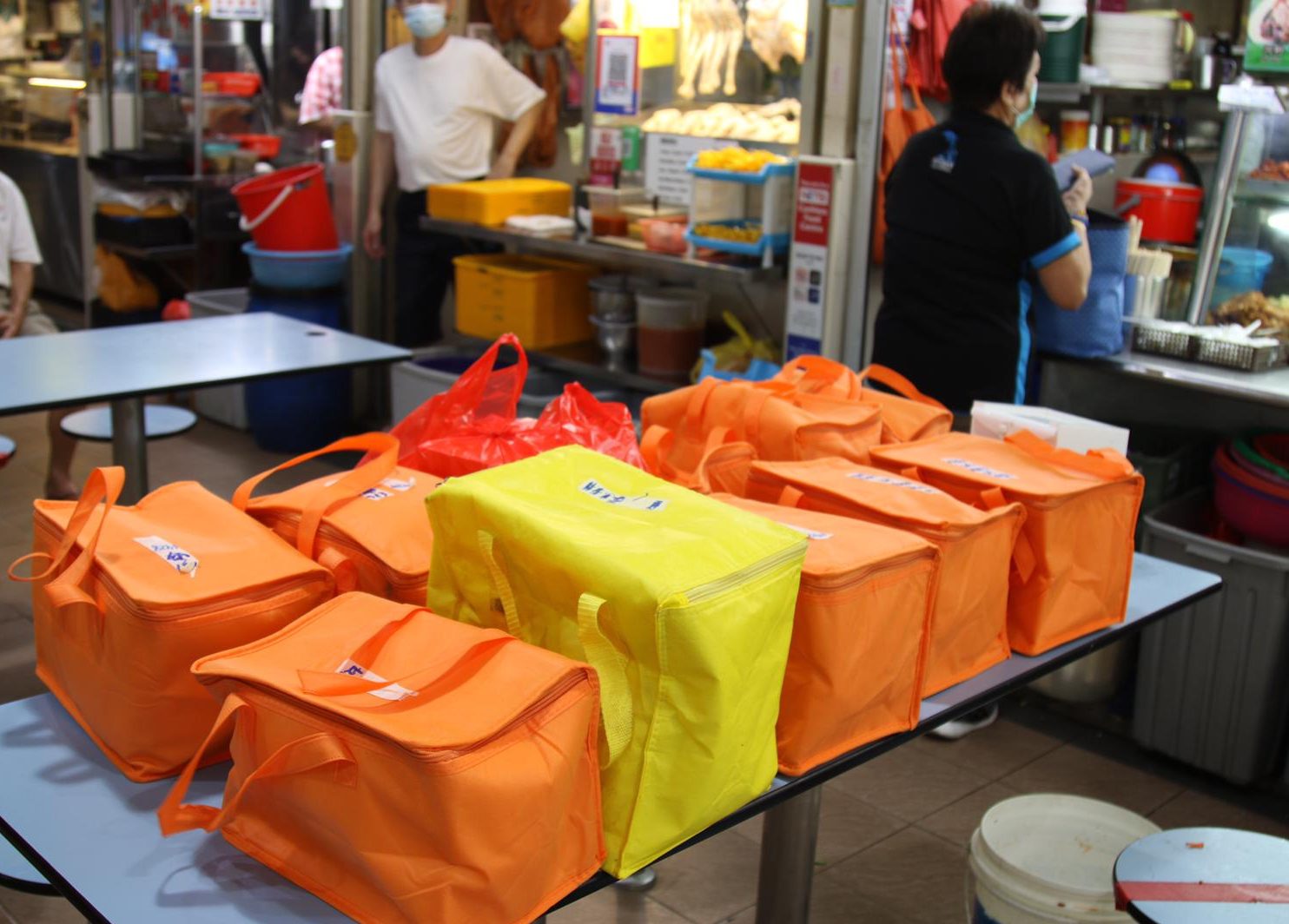 The Amoy Street Food Centre "HQ". Photo by Jane Zhang.
The Amoy Street Food Centre "HQ". Photo by Jane Zhang.
Here at Amoy Street Food Centre, hawkers have adopted the practice of bringing the orders over to a set of tables in the same general area every day — a kind of "HQ" area.
While waiting for the orders to be ready, we head over to Hong Lim Food Centre to collect the orders from there.
At Hong Lim Food Centre, there isn't a "HQ" set-up, so Lim goes around to each stall to pick up orders individually.
Unlike other delivery platforms, which typically charge a separate delivery fee for each order from a different stall, Lim and Tai decided to implement a flat S$8 delivery fee for any combination of orders from any one hawker centre, as long as the order is under S$100.
This arrangement helps to enable people to make larger orders, involving many different stalls. This can be especially helpful to the smaller stalls:
"For example, you might want to eat chicken rice today, but your family might want to order from some other stalls. So usually, end up they would just choose one stall to order from. But having this, they have the flexibility to order from multiple stalls.
And maybe even support the dessert, which not a lot of people usually order for takeaway. Because if you calculate your delivery fee, another S$4, S$5 for one single desert, people might not be keen to do that. But by lumping it as a single delivery fee, it will encourage people to try out different stalls."
Lim tells me about a muffin stall auntie at Amoy Street Food Centre who was hesitant to join Hawker Heroes at the beginning. She said that no one would want to order muffins for delivery.
But after Lim explained to her that customers who buy from different stalls may wish to order a muffin as well, she agreed to join. To date, Lim and Tai tell me, Hawker Heroes has sold more than 200 of her muffins.
On average, they say, an order through Hawker Heroes supports between two to three different stalls.
And while S$8 may be considered by some to be an above-average delivery fee, it is necessary, the duo tell me, because all fees go to the drivers, to ensure that they are compensated fairly.
This is especially necessary since the S$8 covers cross-island delivery (with the exception of Sentosa and Jurong Island), so the delivery fee needs to be enough to compensate the delivery drivers for the distance.
And Lim and Tai have found that their customers are willing to pay the amount because they understand the purpose of the initiative:
"For those that are with us, they know what we do. And as a company, we are very open with our customers, with our vendors. So I guess that helps to build the trust that we're not here to be profiting, to be millionaires, from this."
Developing a personal relationship with the hawkers
As we stop by different stalls at Hong Lim Food Centre to pick up the orders, Lim chats with the hawker aunties and uncles, and is clearly a familiar face to them all.
Lim stops by a Hainanese curry rice stall to buy some pork meatballs for us to snack on. The aunties greet him warmly, and share tips on how to eat them for the most flavourful experience.
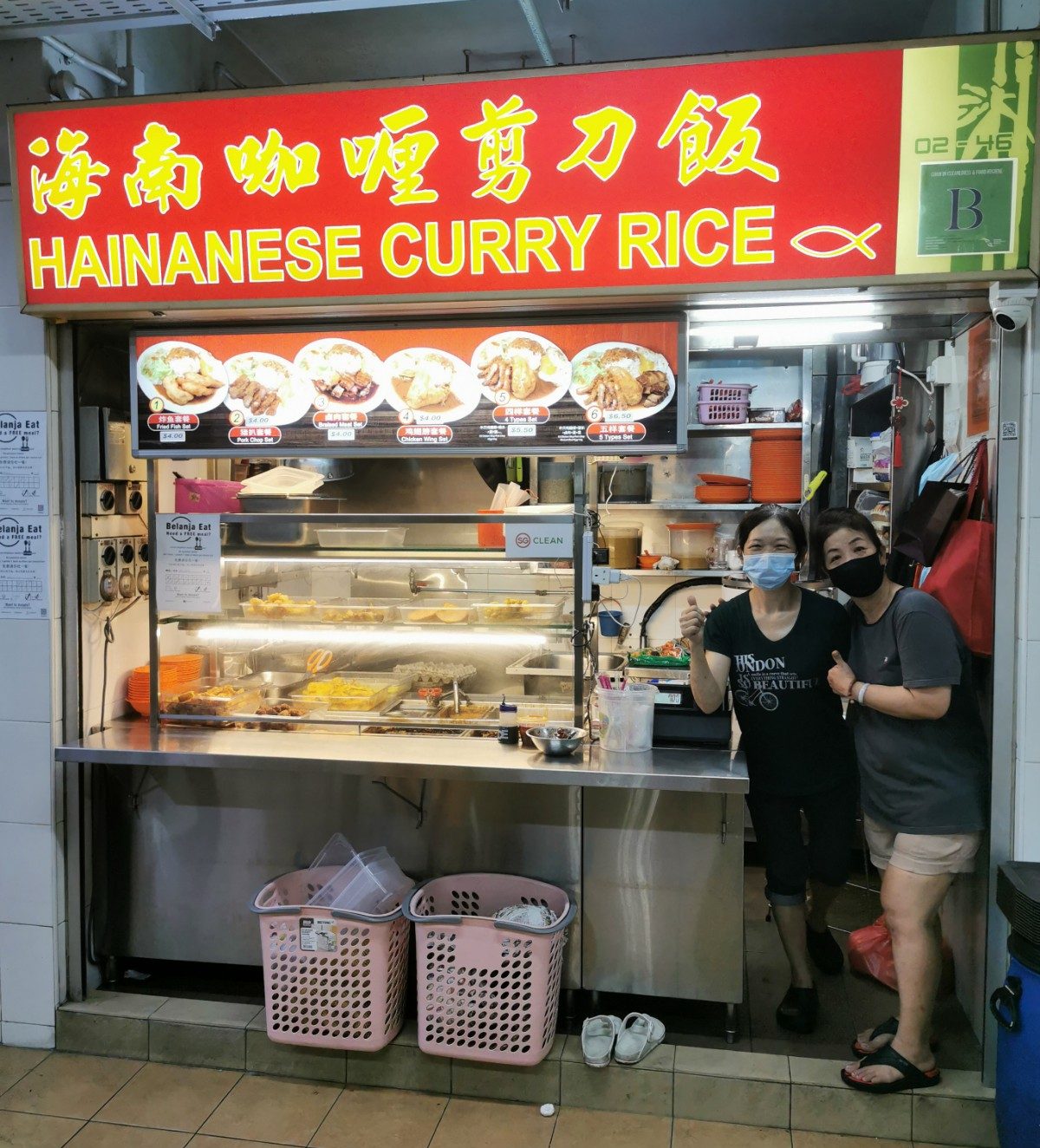 Photo courtesy of Hawker Heroes.
Photo courtesy of Hawker Heroes.
When Lim tries to pay, the aunties shoo him away, before finally agreeing to accept S$2. Lim explains that he avoids eating hawker food when he is on shift, because he knows that the hawkers will insist that he doesn't pay for his food.
However, Lim's rapport with the different hawkers did not come easy.
When Hawker Heroes first began, some of the hawkers were sceptical. They didn't understand why the platform wouldn't charge them anything, when other delivery services were taking a significant cut.
However, because business was so bad during Circuit Breaker, Lim says, many stalls decided to take a chance with Hawker Heroes. With daily visits, they became familiar faces over time and began to gain the hawkers' trust.
Between Lim and Tai's initial efforts and the subsequent word-of-mouth referrals, there are now 86 stalls registered with Hawker Heroes.
An auntie who runs a bak kut teh stall, tells me in Mandarin that she figured it was worth trying out since it didn't cost her anything.
She joined in hopes that orders would increase.
"Even if it's just one or two packets, okay lor. As long as you're willing to deliver, we're willing to make."
Business is very bad currently, only half of what it used to be, she says, but they can't utilise any other delivery platforms, as they take too large of a cut.
"How can we do that? Later, I get back the money and only get around S$3 per bowl. If I sell bak kut teh for 10 plus dollars, who would eat it?"
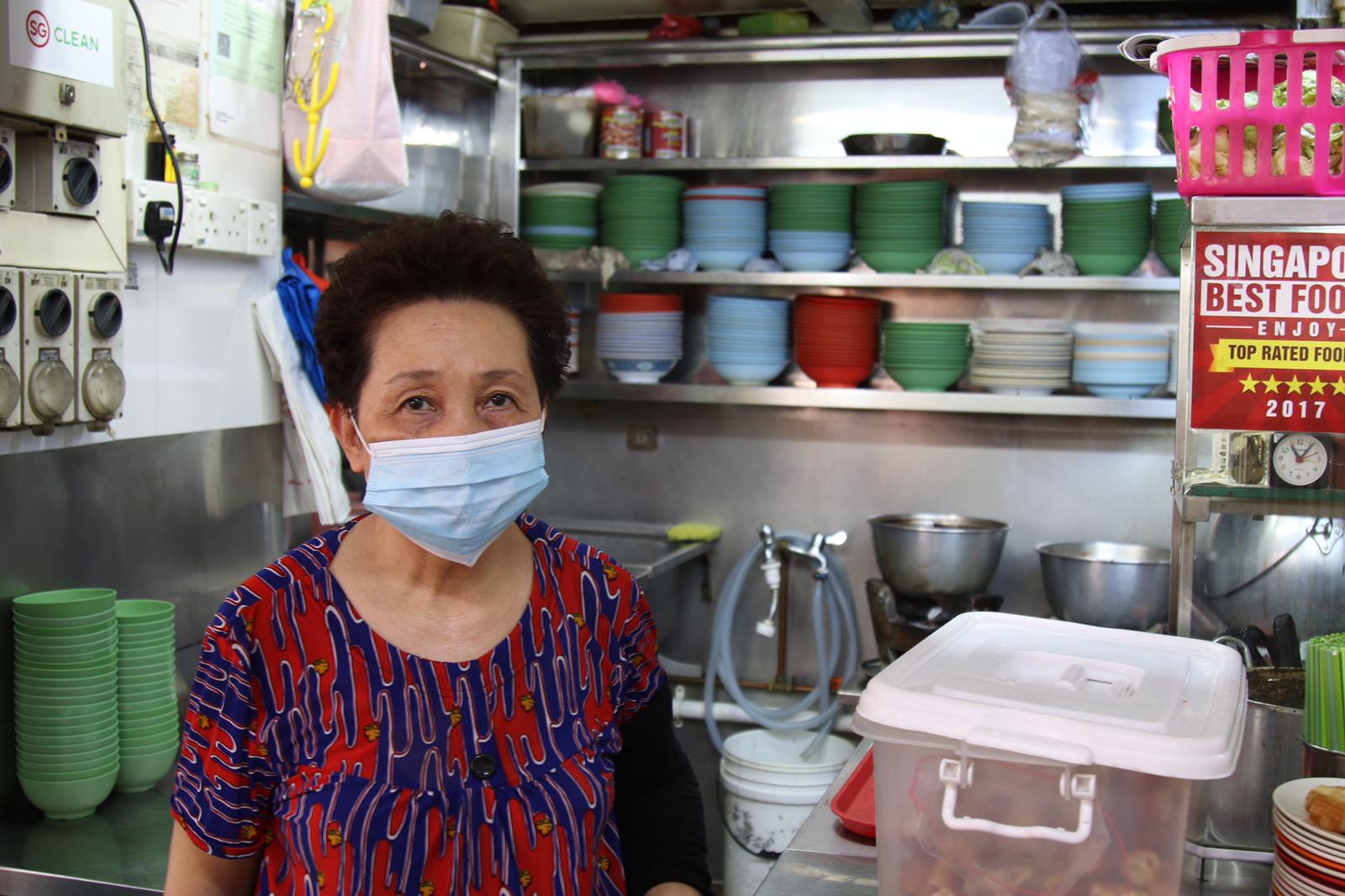 Photo by Jane Zhang.
Photo by Jane Zhang.
Organising order deliveries
After picking up orders from Hong Lim Food Centre, we head back to home base at Amoy Street Food Centre, where we meet up with the other driver for the day, Shaun.
Back at the "HQ", Lim and Shaun arrange the orders according to their destinations.
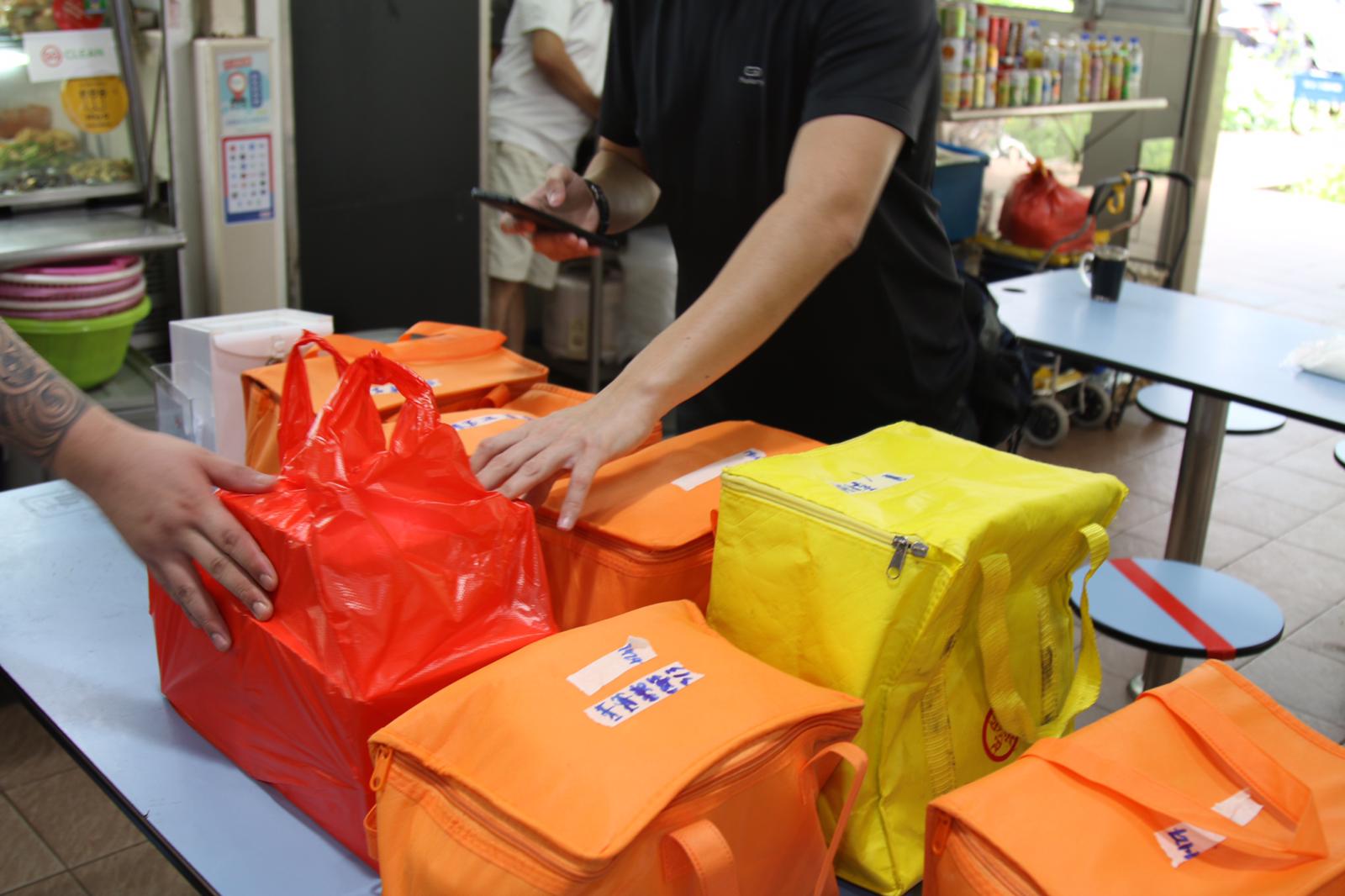 Organising the orders for delivery. Photo by Jane Zhang.
Organising the orders for delivery. Photo by Jane Zhang.
They are also assisted by James, a 26-year-old who helps out at his mother's vegetarian stall.
Because the stall is near the "HQ" area, James often helps to reserve a table in the morning, and checks in with the hawkers as they bring their food over to be packed into delivery bags.
 James (left) and his mother (right). Photo by Jane Zhang.
James (left) and his mother (right). Photo by Jane Zhang.
James says that he decided to lend a hand to the initiative because he wants to play a part:
"Because it is returning to the society, so I decided to join in as well. Doesn't matter if it's my 'competitors' or what."
Challenge of dealing with wrong or missing orders
With the orders sorted according to delivery routes, it's time to deliver the food to the customers.
 Heading out for delivery. Photo by Jane Zhang.
Heading out for delivery. Photo by Jane Zhang.
Our first delivery location is an office in Orchard.
On the way, Lim explains the importance of their relationship with their customers, and how he feels Hawker Heroes' delivery drivers play a role in that:
"We don't want just anyone to deliver, because they are the faces of Hawker Hero, as well as the Hawkers themselves."
So, in keeping with his hands-on nature, Lim created a training video for the delivery drivers, which contains step-by-step instructions on interacting with customers.
In the video, he shared three steps for providing good service: greeting the customer, asking how they are doing, and making sure that the service is with a smile.
"No-blame" policy for missing or wrong orders
Missing or wrong orders are a challenge that Tai and Lim are actively trying to tackle. They don't have the capacity to hire someone just to double check all of the orders, and have to rely on the hawkers to consolidate their orders and bring them to "HQ".
Inevitably, there will be occasional slip-ups.
En route to our second delivery location, Lim gets a call from one of the hawker uncles from Amoy Street Food Centre. He had forgotten to bring an item down to the "HQ", and one of our orders is missing a dish.
Lim and Tai explain that Hawker Heroes has a "no-blame" policy, in order to make sure that the hawkers and delivery drivers themselves aren't affected:
"Regardless of whatever happens — missing orders, spillage in orders, or late in delivery — Hawker Heroes takes the full responsibility. So hawkers still get paid. Delivery drivers still get paid. But we'll refund the delivery fee to the customers and we will bear it ourselves.
So we actually lost a lot of money in this aspect."
Lim gives the customer a call to pre-empt her about the missing item. We drop off the rest of the order and circle back into town to pick up the item, to complete the delivery.
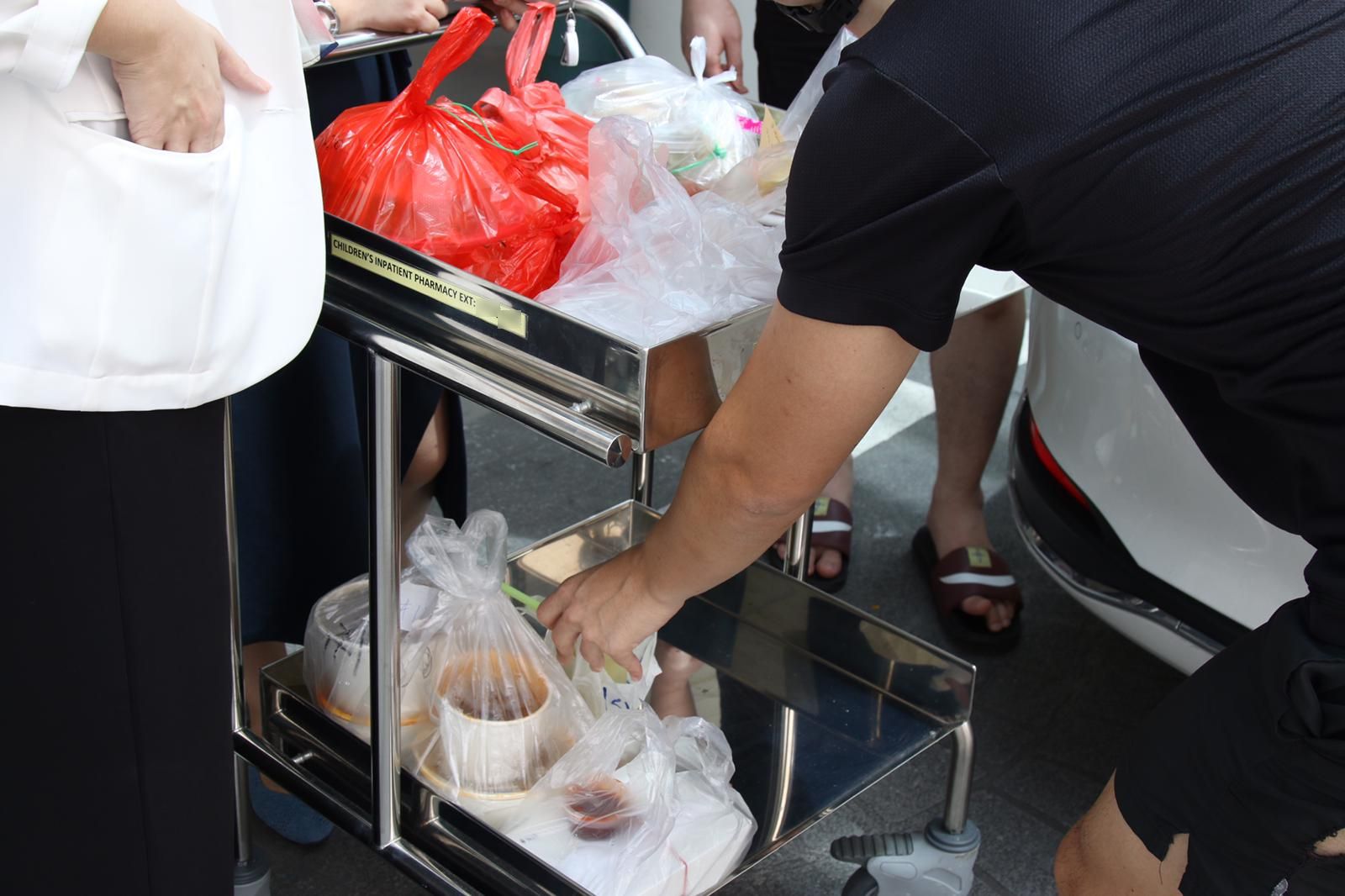 Photo by Jane Zhang.
Photo by Jane Zhang.
Customers believe in their cause
Lim and Tai are very grateful for their customers, whom they say are extremely understanding about the intentions behind Hawker Heroes, and have been encouraging and thoughtful.
"Fortunately, the customers that are with us, they believe in and support what we do. They understand these things do happen, but of course, for us, we continue to try to solve all these problems.....We will be in implementing a new system to help with the missing orders."
Lim shares about one of their regular customers, who regularly tips the delivery drivers, and once even left an ang bao of S$20 as a tip.
And their customers truly seem to be in line with Hawker Heroes' mission as a company. One customer I chat with says that she first found out about Hawker Heroes on Facebook:
"I want to support the local hawkers. And because I can't go out, I cannot support them, so I'm quite pleased that it was actually posted on Facebook."
The customer even ordered extra portions for the staff at her condominium:
"Actually, I'm delivering it for the staff at the management office, because they've been working very hard and they're also at the frontlines, so they see people all the time.
So I thought, if I can do it, I'll just capitalise on the delivery charge and order more."
Next steps will depend on hawkers' needs
Looking back on the last four months of operations, Lim reflects on the impact that they have made:
"I came to realise that actually, us being here — besides bringing sales — is a form of encouragement to them. You know, they see young people around every day, in and out, helping them, communicating with them.
I think they feel encouraged. I guess that's the more social part of this."
To date, the company has helped more than 75 stalls with delivery orders.
"It's not a big number," Lim acknowledges. "But I think to us, it's meaningful that in four months, we're able to do that."
But their next steps will depend on the hawkers' needs, Lim and Tai say. They had originally started the initiative thinking that they would operate during Circuit Breaker.
If they decide to scale up, though, they do acknowledge that some processes will need a rethink:
"I think one option is that, if we do scale to a certain level, then we will need to hire someone to be there to check and bring the orders, and stuff like that. Because now, we're relying on mutual respect and help."
Unfortunately, the situation on the ground doesn't seem to be getting too much better, as Hawker Heroes shared on their Facebook page earlier this month.
Another question to consider will be how Lim and Tai intend to scale up Hawker Heroes' operations, while maintaining the personal relationships that they have built with both hawkers and customers."We're reviewing with each of the hawkers themselves, to ask whether they want us to continue. So I guess it's a demand-supply — if we're able to drive the supply of customers to them, if we see the demand, then I guess we will carry on.
So personally, for both of our commitments, we're willing to commit our time and effort as long as it takes. But as of now, we'll just review every month by month."
Stories of Us is a series about ordinary people in Singapore and the unique ways they’re living their lives. Be it breaking away from conventions, pursuing an atypical passion, or the struggles they are facing, these stories remind us both of our individual uniqueness and our collective humanity.
Totally unrelated but follow and listen to our podcast here:
Top photo by Jane Zhang. Some quotes have been edited for clarity.
If you like what you read, follow us on Facebook, Instagram, Twitter and Telegram to get the latest updates.
